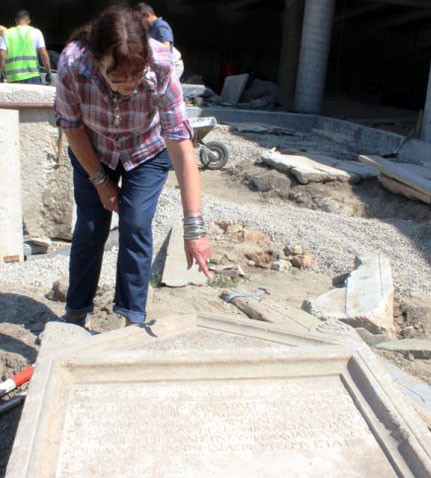Archaeologists recently discovered a precious stone stele (1.40 by 1.29 meters) during conservation and restoration works in the yard of the Episcopal Basilica in Plovdiv. It weighs over 1 ton. The discovery happened quite accidentally. The experts came across the valuable find when they were looking at the stone plates in the atrium. The stele is very well-preserved. Only a small fragment was chipped off, but the restorers will soon reattach this piece to the stele. This is not an ordinary stone slab, lead archaeologist Zheni Tankova contends and adds that the stele is a processed architectural monument dating back to 255 AD:

In the inscription a total of 44 members of the mystic secret religious society worshipping the cult for God Dionysus express their gratitude for having survived the Goth attack in 251 AD when Philippolis was devastated and burnt.
One of the secret society titles mentioned in the list is that of a sabostophorus, a person holding the image of the Roman Emperor. In this list two men out of 44 were mentioned with that title, probably because there were two co-Emperors at that time between 253 and 260 AD. There is no evidence of these Emperors to have ever visited Plovdiv, but the respect for the Emperors was a tradition in the whole Roman Empire, the archaeologist specifies.
The inscription was deciphered with the assistance of Epigraphist Nikolai Sharankov who lectures Latin and Old Greek at the Sofia University. In his view, the script is identical with an inscription in honor of Emperor Gallienus kept at the Regional Archaeological Museum in Plovdiv.
 It is interesting to note that no district rulers were mentioned in the inscription, which probably means that the situation in the Roman province was very difficult, Epigraphist Nikolai Sharankov notes. There are some interesting titles in the list of this mystical society. Apparently, they were connected with the cult for the Emperors.
It is interesting to note that no district rulers were mentioned in the inscription, which probably means that the situation in the Roman province was very difficult, Epigraphist Nikolai Sharankov notes. There are some interesting titles in the list of this mystical society. Apparently, they were connected with the cult for the Emperors.
This confirms the hypothesis of the archaeologists that there was a pagan Roman temple dedicated to the cult for the senior rulers underneath the Basilica. InNikolai Sharankov’s words, the names of the religious society also add to the historical picture of that period, of which evidence is scarce. Only the inscriptions about Gallienus and his military commander Lucius Aurelius Marcianus on the Roman Stadium in Plovdiv are the only evidence.
Archaeologist Zheni Tankova contends that the stele must be placed in a very prominent place, because it is a very important part of the prehistory of the Early Christian Great Basilica.
Author : Neda Velkova, Radio Plovdiv / Adapted for Radio Bulgaria by Darina Grigorova
English version: Kostadin Atanasov
Photos: podtepeto.comThe Sofia Opera has been invited to open the opera season in Salerno, Italy on April 11 and 13 with a performance of the second part of Richard Wagner's tetralogy Der Ring des Nibelungen (The Ring of the Nibelung) - Die Walkure (The Valkyrie). This..
One of Hollywood's greatest directors and producers, Ted Kotcheff (William Theodore Kotcheff), has passed away at the age of 94. His name is associated with landmark films such as ''The Apprenticeship of Duddy Kravitz'' which earned him the Golden..
Five former students in Prof. Andrey Daniel's class gather on his birthday to continue a conversation they once started in the 51st studio of the National Academy of Arts. "Thoughts in Material" is the title of the exhibition..
"Bulgarian" is the title of a new bilingual book featuring the works of Ivaylo Balabanov (1945-2021), which is being prepared for print on the..

+359 2 9336 661
